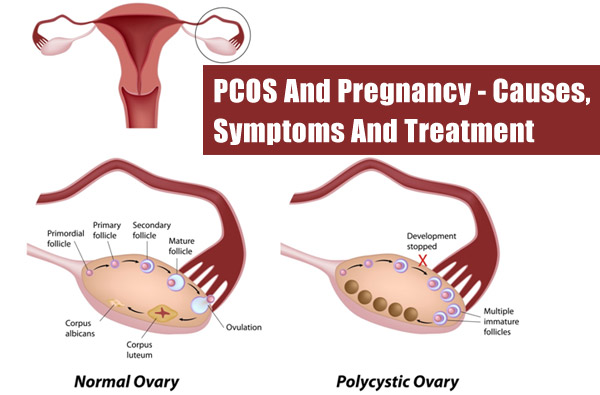What is polycystic ovarian syndrome?
Polycystic ovarian syndrome (PCOS) is a condition in which a woman’s levels of the sex hormones estrogen and progesterone are out of balance. This leads to the growth of ovarian cysts (benign masses on the ovaries). PCOS can affect a women’s menstrual cycle, fertility, cardiac function, and appearance.
What causes PCOS?
While the exact cause of PCOS is unknown, doctors believe that hormonal imbalances and genetics play a role. Women are more likely to develop PCOS if their mother or sister also has the condition.
Overproduction of the hormone androgen may be another contributing factor. Androgen is a male sex hormone that women’s bodies also produce. Women with PCOS often produce higher-than-normal levels of androgen. This can affect the development and release of eggs during ovulation. Excess insulin(a hormone that helps convert sugars and starches into energy) may cause high androgen levels.


Symptoms of PCOS
Symptoms of PCOS typically start soon after a woman begins to menstruate for the first time. The type and severity of symptoms varies from person to person. The most common characteristic of PCOS is irregular menstrual periods. Difficulty getting pregnant may be another reason that leads to diagnosis.
Because PCOS is marked by a decrease in female sex hormones, this condition may cause women to develop certain masculine characteristics, such as:
- excess hair on the face, chest, stomach, thumbs, or toes
- decrease in breast size
- deeper voice
- hair loss
Other symptoms may include:
- acne
- weight gain
- pelvic pain
- depression
- infertility
While not symptoms of the disease, many women with PCOS have other concurrent health problems, such as diabetes, hypertension, and high cholesterol. These are linked to the weight gain typical in women with PCOS.
How is PCOS diagnosed?
There is no definitive test for PCOS. To make a diagnosis, your doctor will review your medical history and symptoms and perform tests to rule out other possible conditions. Your doctor will perform a physical and pelvic examination to look for signs of PCOS, such as swollen ovaries or a swollen clitoris.
Blood tests to measure sex hormone levels are typically ordered, as well as:
- thyroid function tests to determine how much of the thyroid hormone your body produces
- fasting glucose tests to measure your blood sugar levels
- lipid level tests to assess the amount of cholesterol in your blood
A vaginal ultrasound allows your gynecologist to create real-time images of your reproductive organs. A pelvic laparoscopy is a surgical procedure in which your doctor makes a small incision in your abdomen and inserts a tiny camera to check for growths on your ovaries. If growths are present, your doctor may take a small tissue sample (biopsy) for further examination.
How is PCOS treated?
PCOS can be treated, but there’s no cure. Treatment focuses on controlling symptoms and managing the condition to prevent complications. The treatment will vary from woman to woman, depending on specific symptoms. Tips for controlling symptoms may include:
- Eat a healthy diet. A healthy diet and regular exercise are recommended for all women with PCOS, particularly those who are overweight. This can help to regulate your menstrual cycle and lower your blood glucose levels.
- Take birth control pills if you aren’t planning to become pregnant. Women who don’t want to become pregnant may be prescribed birth control pills. These can help treat acne, regulate the menstrual cycle, and lower levels of male hormones, such as testosterone, in the body. If a woman with PCOS is infertile, fertility drugs may be prescribed to aid in ovulation.
- Ask your doctor about medications that may help you. Anti-androgens are drugs that reduce male hormone levels. These can help stop excess hair growth and reduce acne. Diabetes medications may also be prescribed to lower blood glucose and testosterone levels.
- Surgery. Surgery may be recommended for some women with PCOS. Ovarian drilling is a procedure in which your doctor punctures your ovary with a small needle that carries an electric current. This is done in order to destroy part of the ovary. It’s a short-term solution that can promote ovulation and reduce male hormone levels.

Post a comment